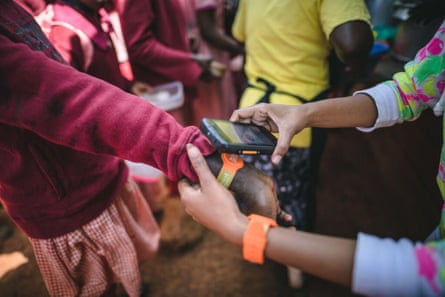Starting in Nairobi, the initiative aims to provide daily lunches for 4 million primary school children and to ‘eliminate the shame of hunger’
The largest school meals programme in Africa is to begin in Nairobi this August, in a drive to “eliminate the shame of hunger in [Kenya]”.
Ten new kitchens, now under construction, will provide 400,000 daily lunches for children in 225 primary schools and Early Childhood Development centres in the Kenyan capital. The programme will start on 28 August, the first day of the autumn term, and the kitchens will employ 3,500 people.
The $8.6m (£6.7m) initiative is a collaboration between Nairobi County and Food4Education, a Kenyan not-for-profit organisation that already supplies meals to 150,000 primary schoolchildren in the city.
According to Save The Children, 26% of children in Kenya are living with stunted growth due to malnutrition. At the launch of the programme on Tuesday, William Ruto, the president of Kenya, said: “We must eliminate the shame of hunger in our country. We will be deliberate and focused in ensuring successful implementation of the school feeding programme. The greatest indignity is for our children to go to school and fast because of lack of food.”
Ruto said the government has allocated 5bn Kenyan shillings ($36m) to extend the existing national feeding programme from 1.6 million children to 4 million, but promised to increase the allocation if more counties committed funding. “We are going to match counties who have a plan on school feeding programme, shilling for shilling, and if we do that we can actually feed 8 million children in our schools,” he said.
Suzanne Silantoi, the county executive of Nairobi city county, said meetings with teachers and parents during last year’s election campaign revealed that most schoolchildren in the city go without lunch, damaging their ability to learn. Child hunger also poses a significant obstacle to school enrolment and attendance in the country.
“We recognise the critical link between nutrition and learning, and that is why the county has institutionalised the school feeding programme. We expect improvement in attendance and performance in public schools,” said Silantoi.

Food4Education was started in 2012 by the Kenyan nutritionist Wawira Njiru from a makeshift kitchen that employed one cook and produced lunch for 25 children in Ruiru primary school.
“The goal at the beginning was to feed 100 children,” said Njiru. “As the numbers grew over the years, I became more ambitious [with a goal to feed] 1 million children. But I didn’t know how it would happen.”
Njiru said she was inspired to provide cheap and nutritious lunches to schoolchildren from poor rural households and informal settlements after witnessing poverty and inequality among her classmates when she was growing up in Ruiru town on the outskirts of Nairobi.
“I went to Australia for my undergraduate degree and while there I fundraised, and raised $250. I used that to construct the first kitchen and purchase the food that kicked off the programme,” said Njiru.
“With this new partnership [with the city government], the number of children served a day will increase to 400,000. Furthermore, as additional partnerships are formed, we anticipate reaching 500,000 children, possibly by the end of next year. These developments bring us significantly closer to achieving the one million children a day goal,” she said.
As well as improving children’s health it has improved enrolment rates. “We have witnessed significant growth of 30%-40% in enrolment in schools we partner with,” said Njiru.
The kitchens will be powered by green energy using steam gas technology, and will also use eco-briquettes. Technology has also played a vital role in the growth of Food4Education: each child is given a wristband called Tap2Eat, which is linked to a virtual wallet that parents use to pre-pay 15 shillings ($0.11) for each meal.
“That partnership with parents is very important because when they chip in, they also feel that they are contributing to feeding their children,” said Njiru. The system also helps parents track their children and understand whether their child is skipping school.

The county government will also use the technology to subsidise the cost of each meal. “Parents will pay five shillings while the government will top up 25 shillings for each meal,” said Silantoi.
Silantoi added that the county government will have a budget of 1.2bn shillings ($8.6m) set aside annually for the school feeding programme. “On average, a child will spend approximately 955 shillings a year. That is what anyone wanting to sponsor a child will pay yearly.”
The partnership between Food4Education and the county government of Nairobi will also create employment opportunities and a market for farmers.
“In this particular project, we will involve the communities and employ about 2,000 people, as well as provide a market for the food produced in the communities, which will improve their economic outcomes,” said Silantoi.
Source: The Guardian






